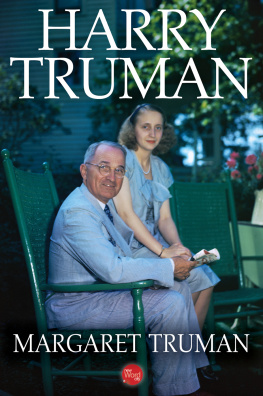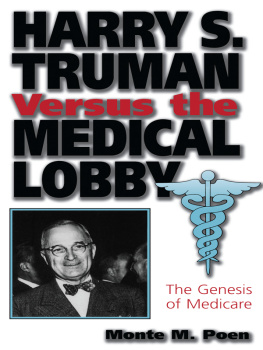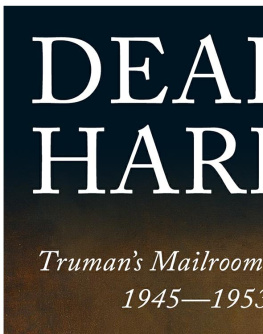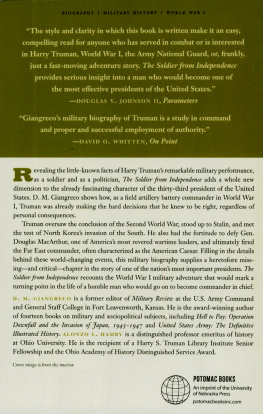Truman
Roy Jenkins

This electronic edition published in 2011 by Bloomsbury Reader
Bloomsbury Reader is a division of Bloomsbury Publishing Plc, 50 Bedford Square, London WC1B 3DP
Copyright Roy Jenkins 1986
he moral right of author has been asserted
All rights reserved
You may not copy, distribute, transmit, reproduce or otherwise
make available this publication (or any part of it) in any form, or by any means
(including without limitation electronic, digital, optical, mechanical, photocopying,
printing, recording or otherwise), without the prior written permission of the
publisher. Any person who does any unauthorised act in relation to this publication
may be liable to criminal prosecution and civil claims for damages
ISBN: 9781448200771
eISBN: 9781448202096
Visit www.bloomsburyreader.com to find out more about our authors and their books
You will find extracts, author interviews, author events and you can sign up for
newsletters to be the first to hear about our latest releases and special offers
Contents
This book was started in 1982, but mostly written in 1984 and early 1985. It arose out of a probably over-elaborate design which had interested me in the early 1970s. I then did some considerable work for a series of back to back portraits of American presidents and British prime ministersperhaps three of eachwhich were to be published in a single volume. It would have been a very big volume. However long books were already in fashion, and I was not then as sceptical of the value of setting the reader a solid thirty to forty hour course as I am now.
In the event only one of the British portraits was written before I again became too closely involved in other occupations to do any sustained writing. When I returned to the task I decided that less elaboration and more speed was necessary. One president would be enough to balance one prime minister. But who should it be? I had thought, for my original scheme, of covering Theodore Roosevelt, Hoover and Franklin Roosevelt. Of these F.D.R. was the most interesting, certainly to a British audience, and the one about whom I knew most. But the more I penetrated the subject the more I found that he suffered from one fatal disadvantage. There was nothing new in the compass of a short biography that I could say about him. The best that I could do would be a re-setting of old facts and familiar anecdotes. And while I was not attempting original research, this was clearly not good enough.
Truman, his successor, suffered from no such disadvantage. He did not have Roosevelts refulgence and he was president for a little less than two-thirds of the time that Roosevelt wasbut as Roosevelt was president for a third longer than anyone had ever been before this was not a disqualification. Truman presided over the creation of the Western world as it still broadly exists today. The creation of NATO, the Marshall Plan with its emphasis on European unity, the resistance to Soviet expansion, peacefully in Berlin, bloodily in Korea, all had long-lasting consequences. He was a president of great significance. He was an odd and in one central respect a paradoxical man, with whom, had I known him well (I met him once, for an hour) I would not, I suspect, have got along easily. He had an interesting and not over-known provenance. Although he has inspired biographies and other books about him running well into double figures (of which at least three are good) I did not have any of that sense of repleteness which had afflicted me with Roosevelt. I thought that there would be a good deal that was reasonably fresh to say about Truman, and found this in practice to be so.
I am indebted to a number of different groups of people for varying forms of assistance. Of those remaining who knew Truman well Mrs Clifton Daniels (Miss Margaret Truman) and her husband, Mr Averell Harriman and Mr Clark Clifford were particularly helpful. So, on this side of the Atlantic, was Lord Franks, British Ambassador in Washington from 1948 to 1952. Mr Robert Donovan, the most authoritative chronicler of the Truman presidency, answered several important questions. Mr and Mrs John Masterman of Kansas City gave me great assistance in visiting, in December 1983, the places of importance of Trumans early life.
My secretaries Miss Celia Beale and Miss Jenny Ross typed the manuscript. Miss Diana Fortescue, greatly assisted by the library of the United States Embassy in London, buttressed by that of the House of Commons, checked many facts and some interpretations.
The typescript was read and helpful suggestions were made by Professor Arthur M. Schlesinger (who made many invaluable points), Professor John Kenneth Galbraith, Mr Mark Bonham Carter, Sir Ian Gilmour, Lord Harris of Greenwich, Mr John Lyttle, and my wife. Mr Irwin Ross, whose Loneliest Campaign chronicles the 1948 election, read the chapter which covered that vital event in Trumans life. To all these and a number of others, I am very grateful.
October, 1985 R.H.J.
1
The Transition
For twelve years and one month Franklin Roosevelt was President of the United States. It was the longest period of continuous elective power which had been seen anywhere in the world for a century or more. Moreover, this decade and a quarter coincided with the advance of America to world leadership.
Then, on April 12th, 1945, Roosevelt died, suddenly if not unexpectedly, at Warm Springs, Georgia. Three hours later Harry S. Truman was sworn in as the 33rd President. He was nearly 61. It was the most intimidating succession in the English-speaking world since Addington succeeded William Pitt in 1801: Pitt is to Addington as London is to Paddington, Canning wrote. And Paddington did not then even have a railway station. But Addington had been an intimate of Pitts for years and enjoyed his continuing friendship until their quarrel of 1803. Truman knew the Senate, of which he had been a member since 1934, but his experience of the executive branch, with its expanded war-time complications, was minimal. He had been Vice-President for less than three months. During this period, except at Cabinet meetings, he saw Roosevelt twice. Also, as Truman recorded, Roosevelt never discussed anything important at his Cabinet meetings.
Even more certainly Roosevelt never discussed anything important with his Vice-President. He looked to Truman to keep the Senate in order and to ensure that his peace treaty of the future did not meet the same fate as that which had befallen Woodrow Wilsons in 1919. He had encouraged him to do some campaigning in 1944, adding rather incongruously I dont feel like going everywhere. (In fact he went only to New York, Chicago, Boston and Philadelphia.) But there had been no question of treating Truman as a deputy head of government. In accordance with the American tradition, he regarded him as part of the legislative not the executive branch. He treated him as he had treated Garner and Wallace, and as indeed much as every previous president had treated every previous vice-president. There was however an essential difference between Truman and his two predecessors. They were just vice-presidents, threatened with the obscurity which was mostly the historic fate of those who had occupied that office. Truman, from the moment of his nomination, was a likely president. But Roosevelt was the last man who wanted to recognize that. He never thought of including him in the party of a hundred or more Americans who went to the Yalta Conference in late January 1945. He gave him no special account of the outcome. Nor did he tell him about the Manhattan project, which was on the threshold of creating the atomic bomb.







